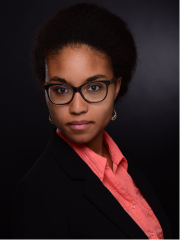Alvine Datchoua-Tirvaudey

PhD student
Address
Contact
Alvine Datchoua-Tirvaudey
Research Associate and Doctoral Researcher
Address
Universität Hamburg
Grindelberg 5, Zi. 309
20144 Hamburg
Contact
Tel.: +49 40 42838-8141
Fax: +49 40 42838-9211
Email: alvine.datchoua-tirvaudey"AT"uni-hamburg.de
Linkedin: www.linkedin.com/in/alvine-datchoua
Universität Hamburg
Fakultät für Mathematik, Informatik und Naturwissenschaften (MIN Faculty)
Department of Earth Sciences
Institute of Geography
Research Group Climate Change and Security (CLISEC)
Research Associate
Center for Earth Sciences Research and Sustainability (CEN)
Cluster of excellence CliCCS - Climate, Climatic Change and Society
B2 -Dynamics of climate governance: norms, contestations and policies
Work Package 2- Norm contestations in sensitive regions: Mediterranean/ Arctic
Alvine Datchoua-Tirvaudey is a Research Associate at the Center for Earth Sciences Research and Sustainability (CEN) in the Cluster of Excellence CLICCS – “Climate, Climatic Change and Society”. She works for the project CEN-CLICCS- B2, which focuses on ‘Dynamics of climate governance: norms, contestations and policies’. She has been affiliated to the Research group CLISEC since May 2019.
Her doctoral research is supervised by Prof. Dr. Jürgen Scheffran ( MIN Faculty, Research group CLISEC) and co-supervised by Prof. Dr. Antje Wiener (WISO Faculty, Chair of Global Governance). It looks at ‘Local contestations of global climate governance in sensitive regions’ and focuses especially on the Arctic(s) in tandem with the Mediterranean(s).
ABSTRACT – “It appears that global norms of climate governance do not match the expectations of local populations worldwide and interests of interdisciplinary actors at different scales. In that regard, this study investigates into local and regional contestations in the Arctic(s) and the Mediterranean(s). It observes the gaps in the practices of global climate governance norms. The research focuses especially on climate justice claims and contestations of offshore and onshore energy (both renewables and fossil fuels). In that respect, cultural diversity in designing global climate governance is a focal point of resourcefulness and an asset for climate change transformation(s) and mitigation(s). As other international organisations, the UNFCCC can be criticised for its Western-centred philosophical thinking with neo-liberal and neo-colonial approaches to governance. This lack of inclusivity creates issues of legitimacy of the institution and/or the norms produced at a global level. Therefore, one will look at different bottom-up pathways and diverse cultural and philosophical perspectives to re-think multi-scalar climate governance. “
Previously, she graduated from the University of Aberdeen with a Degree of Master of Arts in Geography and International Relations (2014- 2018). She also undertook one year of study exchange at the University of Oslo in Norway (2015-2016), where she started focusing seriously on climate change studies, climate politics and climate governance. There, she worked as an intern for cChange-Transformation in a changing climate (https://cchange.no/), co-founded by Prof. Dr. Karen O’Brien and Dr Linda Sygna.
